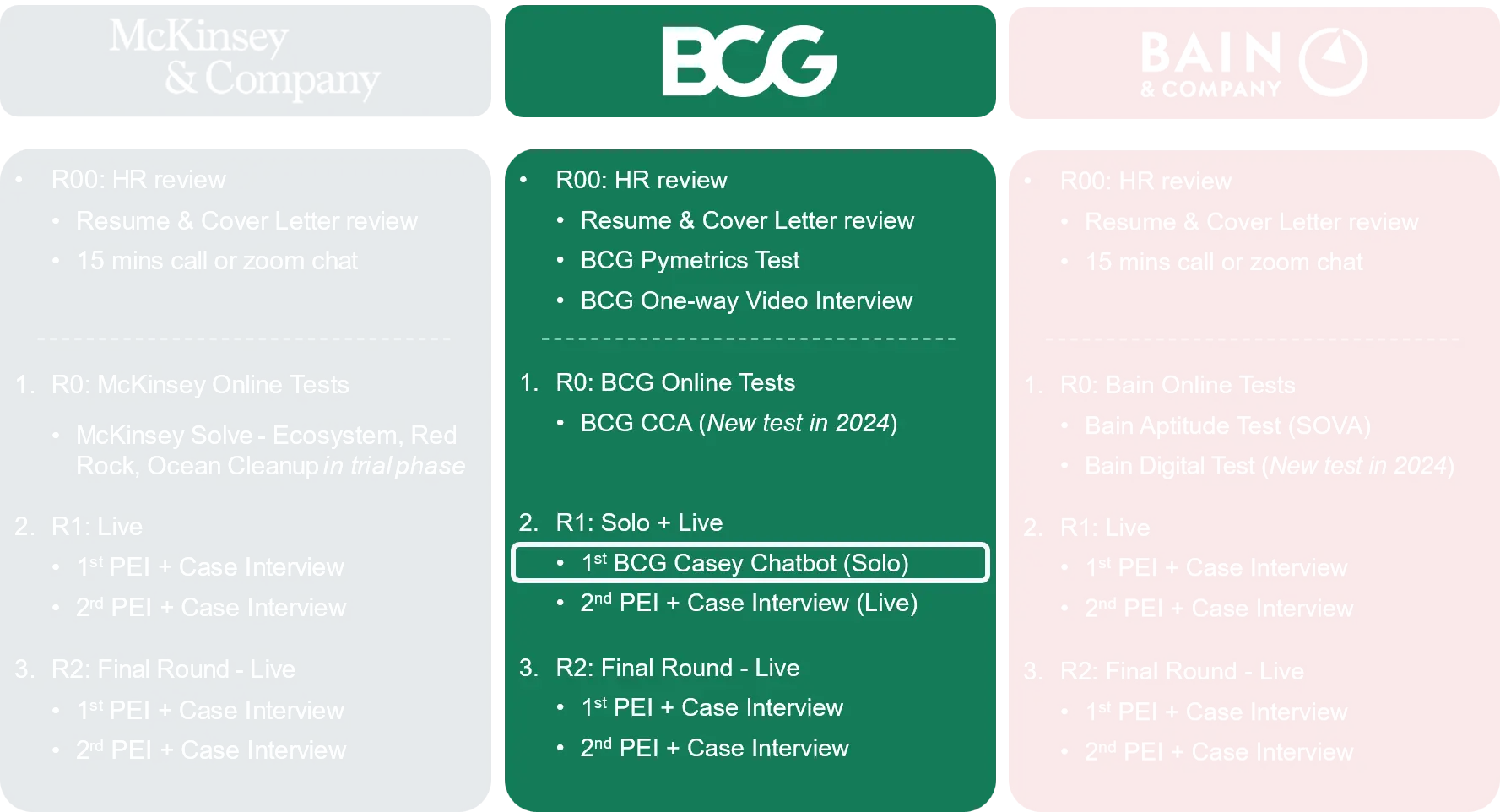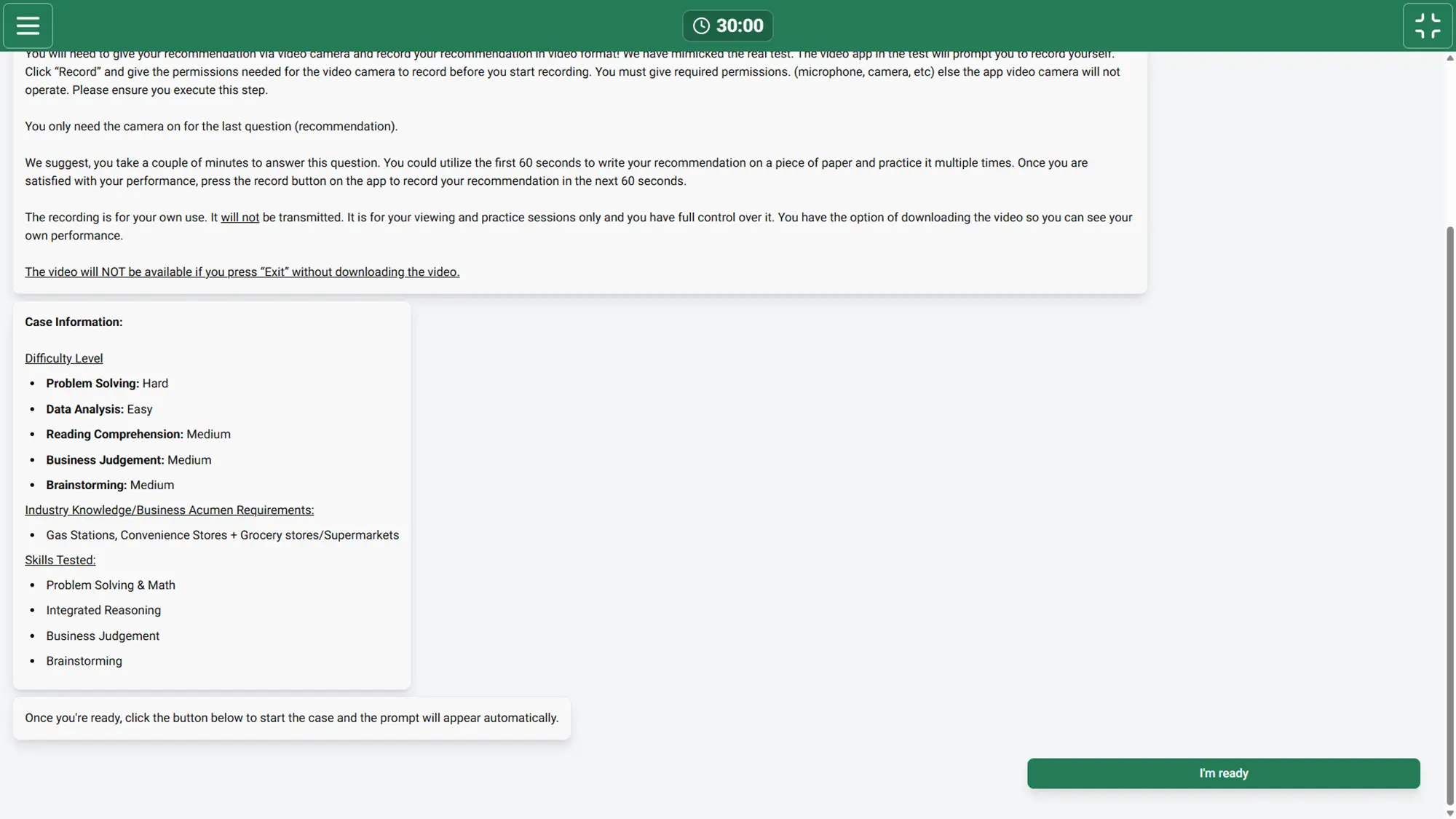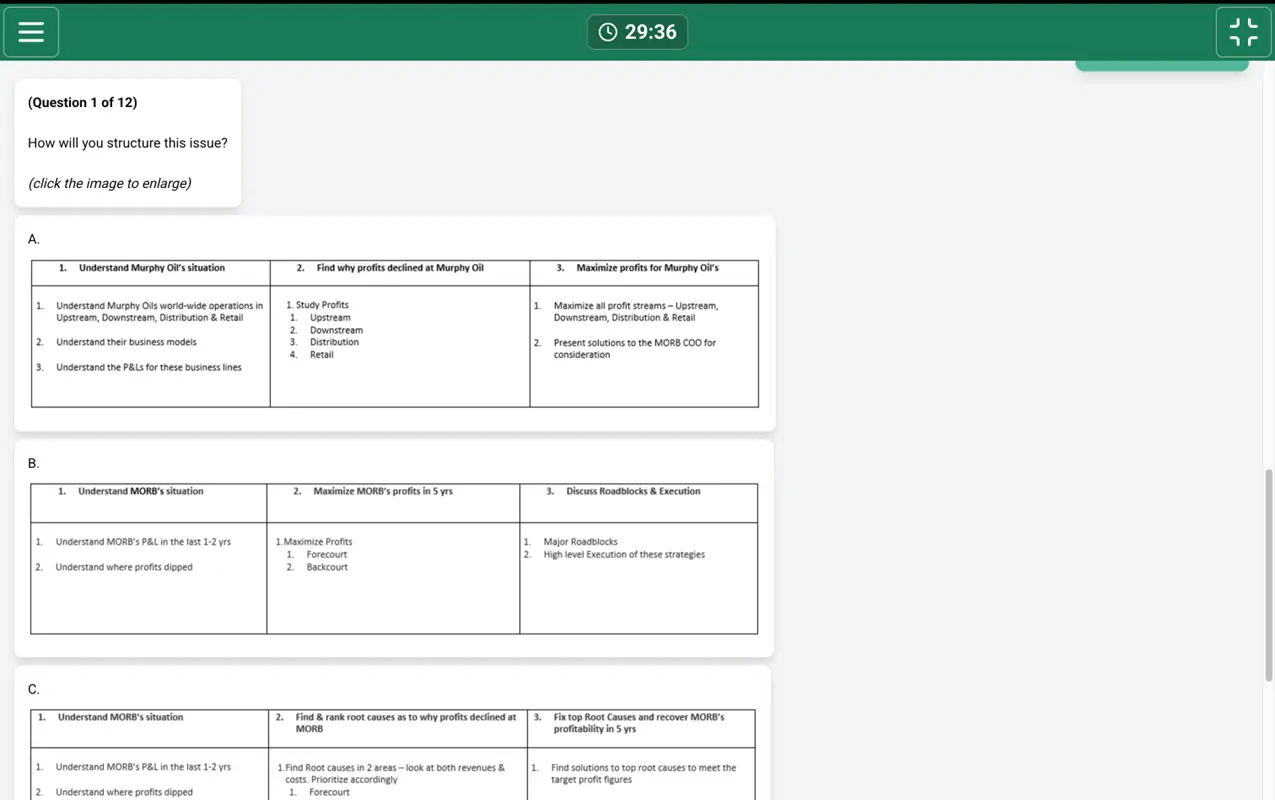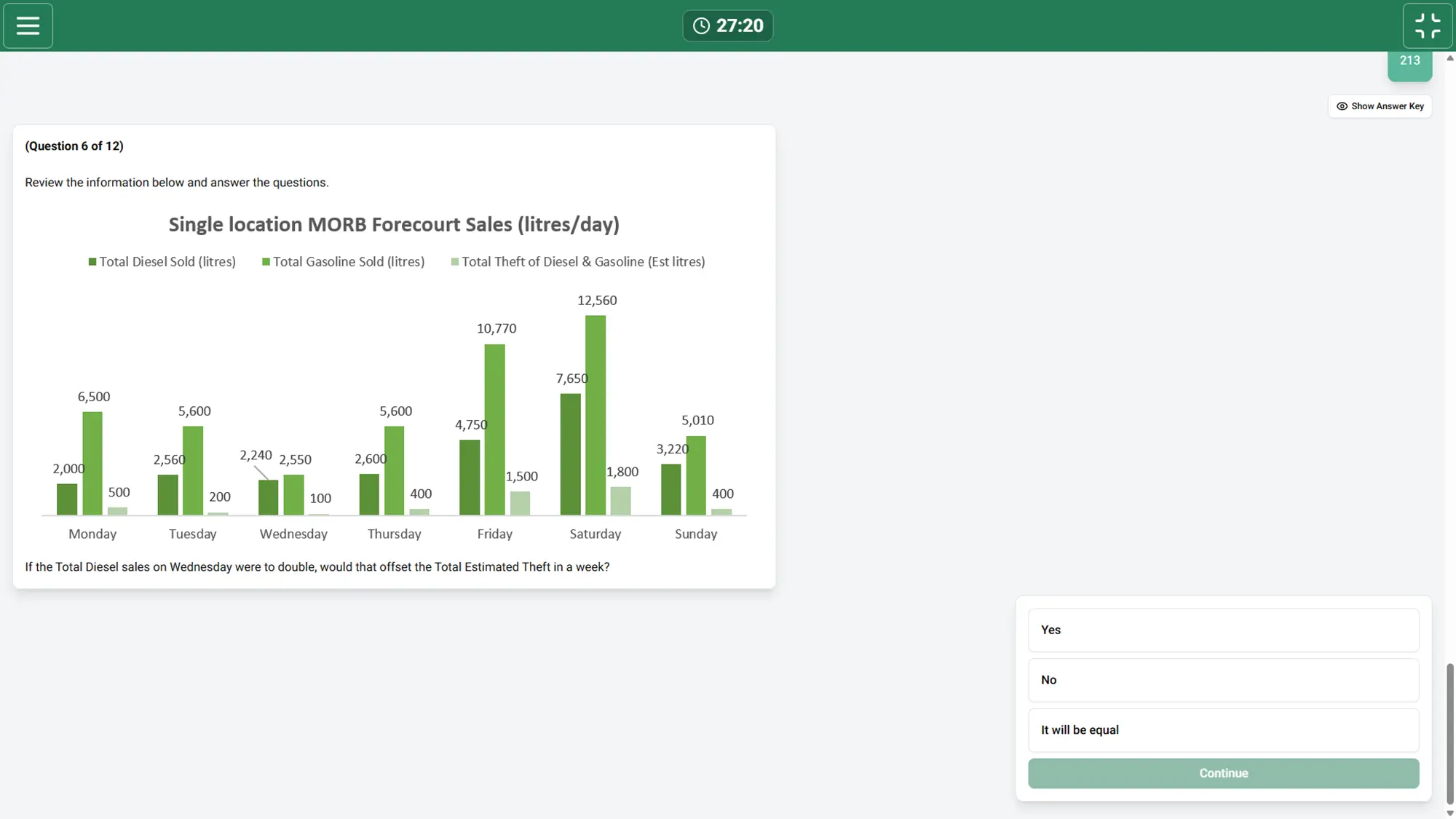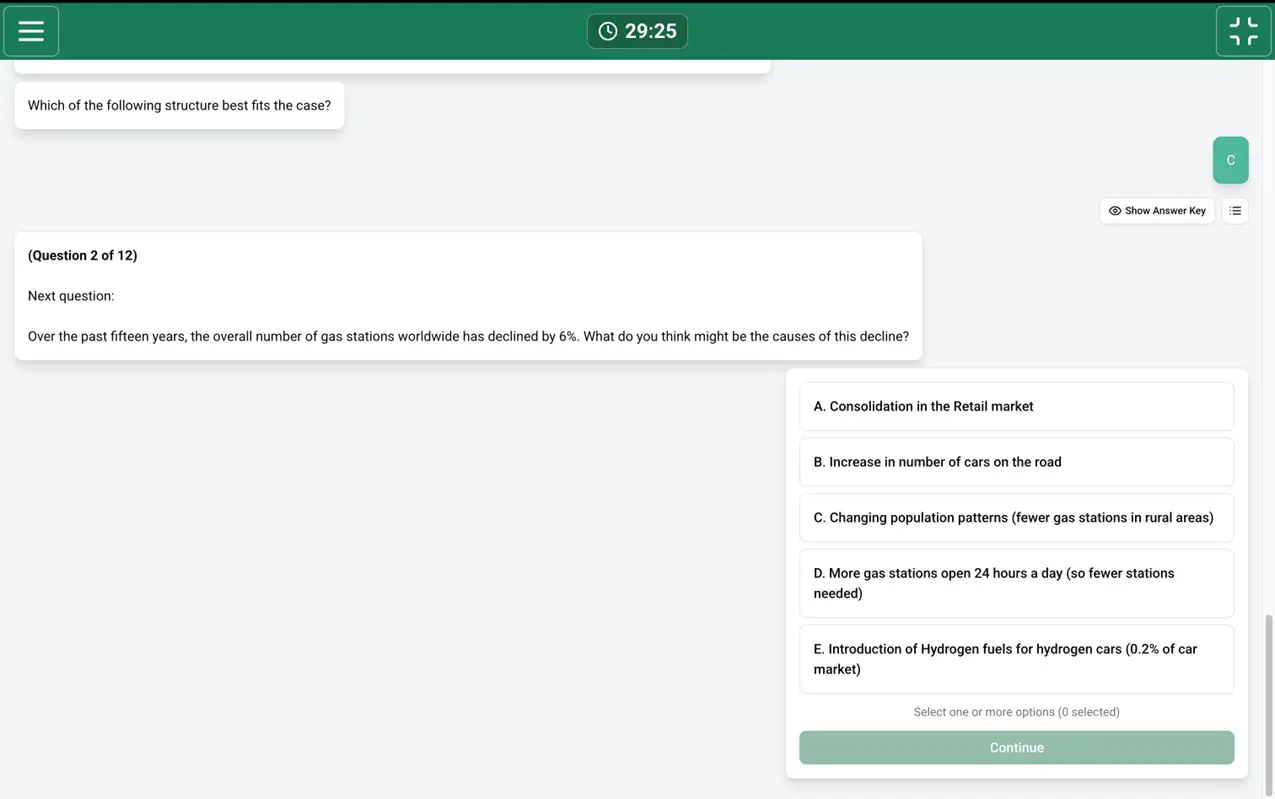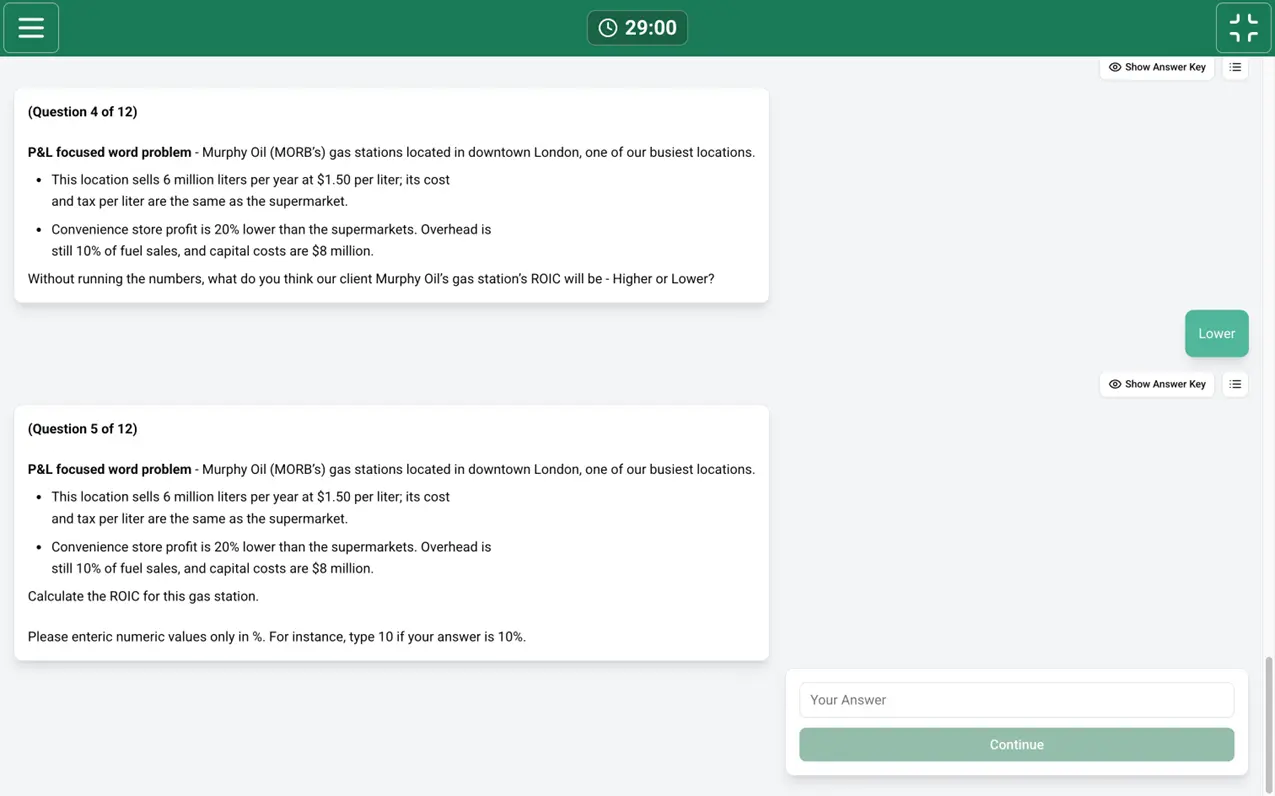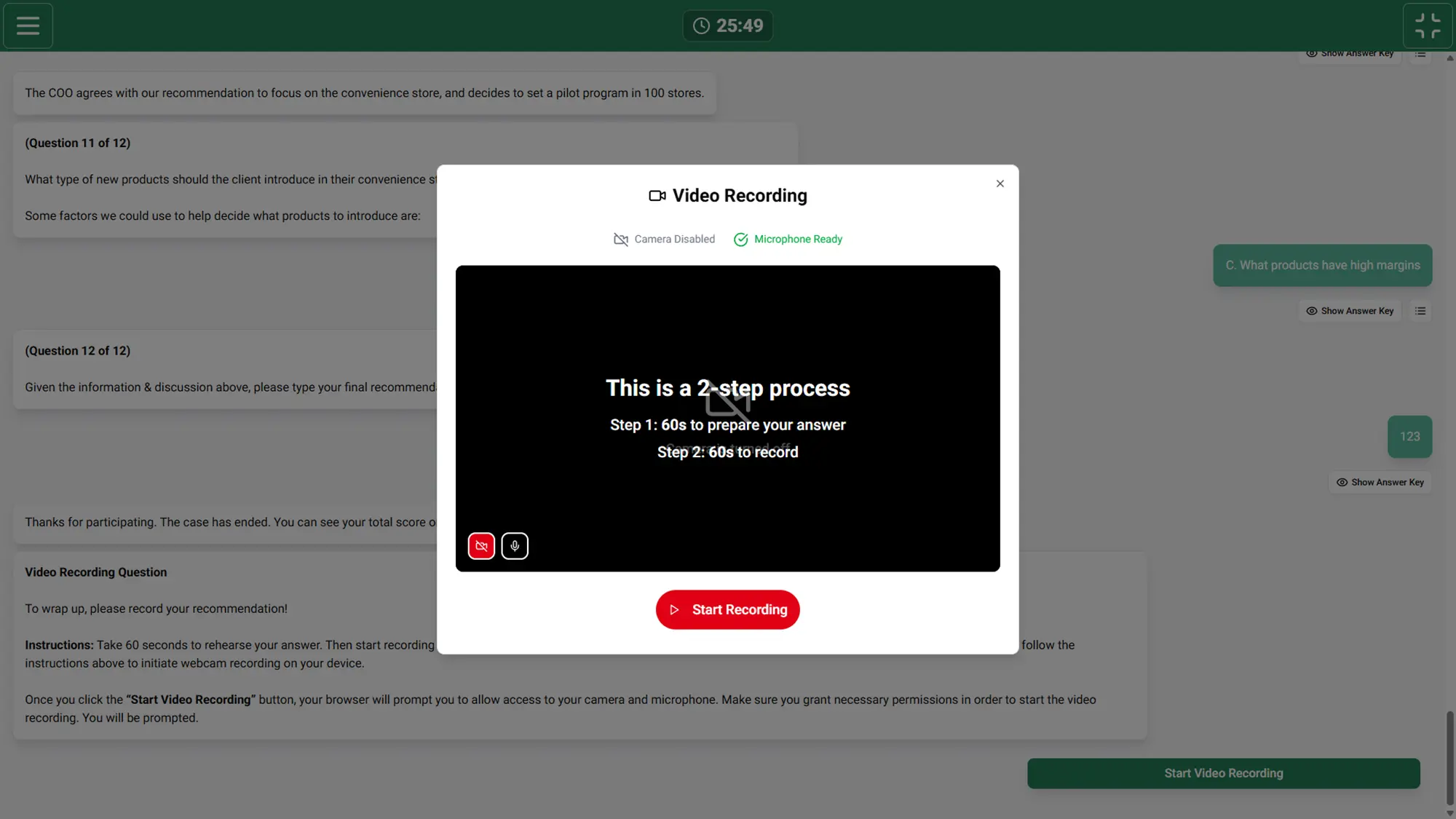Consulting Articles > Consulting Online/Screening Tests > BCG Online Case (Casey Chatbot): Guide [2026 Edition]
Table of Content:
- What is BCG Online Case (Casey Chatbot)?
- When does it appear in the BCG Interview Process?
- What makes the BCG Casey Chatbot test challenging?
- What traits is BCG assessing in BCG Online Case?
- BCG Online Case Format
- Resources & Tips to Prepare for the BCG Online Case
BCG Online Test (Casey Chatbot) is a pre-interview screening assessment used by Boston Consulting Group (BCG). If you're a candidate seeking a consulting position at BCG, you may come across this test as part of your application process.
Want to practice? Check out our FREE BCG Casey Chatbot Simulation
What is BCG Online Case (Casey Chatbot)?
The BCG Online Case, also referred to as Casey Chatbot, is a business case presented in a conversational style. It involves a series of questions in an interactive chat format. Essentially, it's a virtual interview conducted by a chatbot named Casey to evaluate a candidate's ability to solve problems within a limited time frame. (Click to see all screening tests by McKinsey, BCG and Bain!)
BCG uses this Online Case as part of its candidate screening process before moving on to traditional case interviews. BCG is in the process of slowly replacing its traditional BCG Potential Test with this innovative BCG Online Case Chatbot.
The one and only existing platform to practice Casey Chatbot for FREE!
When does it appear in the BCG Interview Process?
The BCG Casey Chatbot is part of Round 1 BCG Case Interviews. This is a new development.
Earlier, Round 1 BCG interviews consisted of two interviewers virtually or in person.
Now, as part of Round 1, BCG uses the BCG Casey Chatbot. Hence you will get a Casey Chatbot and then will meet an interviewer, either virtually or in person. It is a completely different format than what you might be used to. Hence take time to understand the new format, practice thoroughly and only then take the BCG Casey Chatbot test.
Please see the BCG interview process below.
Figure: BCG Interview Process
NOTE - MBBs constantly edit their hiring steps & tests. All possible steps are listed. You might not get all of them. The steps are indicative. You will get specifics from MBB recruitment. Follow those.
What makes the BCG Casey Chatbot test challenging?
Many candidates find the BCG Casey Chatbot test challenging because of the following reasons:
- It is a chatbot format, where candidates have to read and type answers, rather than interact with human beings
- It is an entirely one-way process. There is no opportunity to ask clarifying questions. In fact, candidates describe it as a GMAT, GRE or SAT test in a chatbot format. Many candidates struggle with reading lots of information, which mimics the Reading comprehension section of the GMAT or drawing from multiple data sources, which mimics the Integrated Reasoning Tests.
- There is a video element to this test, which is new for many candidates. Candidates need to showcase their verbal, presentation and visual skills. Many candidates struggle with formatting answers on the spot and speaking in the camera.
What traits is BCG assessing in BCG Online Case?
The BCG Online Case assesses four critical skill categories:
- Brainstorming Skills: Assessing a candidate's grasp of business acumen and their ability to brainstorm ideas for making informed business judgments.
- Structuring Skills: Assessing the ability to organize thoughts and prioritize problem-solving tasks.
- Problem Solving Skills: Measuring proficiency in handling numerical concepts for problem-solving.
- Data Analysis Skills: Evaluating candidates' capacity to proficiently analyze and interpret data, enabling them to make informed decisions and offer valuable insights to the client.
These criteria align precisely with the Case Interview Modules that BCG assesses during actual case interviews.
BCG Online Case Format
Time Limit
The BCG Casey test typically lasts for 25-30 minutes and includes 6-8 questions. Once you start the assessment, there's no option to pause it, and you'll be under significant time pressure. Additionally, the bot reminds you of the remaining time every five minutes, which further contributes to the overall stress of the test.
Figure: CaseBasix BCG Casey Chatbot Game Interface
Question Types
1. Structuring Questions
These questions often depict a scenario or dilemma and task candidates with pinpointing the best option or the type of data that should be gathered. While they may initially seem data-centric, they actually necessitate candidates to approach the question using proper structure.
Examples of this question type are:
- Which market research data should our company prioritize when considering entering a new international market?
- What type of cost data should our organization collect to identify potential areas for cost optimization?
- Which information should our product development team gather to determine the viability of launching a new product?
Figure: BCG Casey Chatbot - Structuring Question
This question type closely mirrors the format of the Structure Module in the actual case interview.
2. Data Analysis/Logical Questions
The Data Analysis/Logical in the BCG Casey chatbot test evaluate your capacity to analyze a given scenario, apply logical reasoning, and make informed judgments. These questions often entail assessing various courses of action, identifying cause-and-effect relationships, or determining the most logical conclusion based on provided information which can be text or graphs.
Examples of this question type are:
- Given the current economic trends and competitive landscape, which of the following marketing strategies would MOST LIKELY result in increased market share for our product?
- Considering the historical performance of these stocks, which investment portfolio would MOST LIKELY yield higher returns in the next quarter?
- In a manufacturing plant with limited resources, which of the following process improvements would MOST LIKELY lead to a reduction in production costs?
Figure: BCG Casey Chatbot - Data Analysis Question
This question type closely mirrors the format of the Data Analysis Module in the actual case interview.
3. Brainstorming Questions
These questions involve brainstorming ideas, insights, factors, and more, within a given context. This context can encompass tasks such as identifying root causes, assessing the effects of specific events, analyzing options, considering potential problem solutions, and more.
Examples of this question type are:
- Why are US consumers transitioning to large SUVs?
- Should Dyson, a vacuum manufacturer, launch its own car?
- A company makes money by offering subscription services. What are the advantages of offering a premium service?
Figure: BCG Casey Chatbot - Brainstorming Question
This question type closely mirrors the format of the Brainstorm Module in the actual case interview.
4. Quantitative Questions
These questions involve you to do calculation to answer the question. In each case, you can expect to encounter approximately two quantitative or mathematical questions. These questions are typically presented in a short answer format, although there may be occasional instances of single-answer multiple choice questions.
These questions can come in the form of word problems or tasks involving the interpretation of data through graphs. Typically, you'll be presented with a substantial amount of data points, and the key challenge lies in your ability to sift through this information and extract the pertinent details needed to effectively solve the problem.
It's important to note that you do not need to possess advanced knowledge in complex areas like accounting, finance, linear algebra, or calculus. Instead, the focus is on mastering fundamental concepts, including:
- Mathematical Topics: Fraction, Decimal, Percentage, Finance, Statistics, Ratio & Proportion, Time & Money, Units, and Estimation.
- Basic Mathematical Operations: Addition, Long Addition, Subtraction, Multiplication, Long Multiplication, Division, and Percentage.
- Chart Types: Bar Chart, Pie Chart, Line Chart, Tables, Mixed Chart, Profit & Loss Tables, Waterfall Chart, Scatterplot, and Bubble Chart.
Figure: BCG Casey Chatbot - Quantitative Question
This question type closely mirrors the format of the Quant Module in the actual case interview.
Answer Format
There are four types of answer formats, followed by a final video pitch:
1. Single-Answer Multiple Choice
You will receive a question along with a list of answer choices, but only one of these choices is correct. It's crucial to keep in mind that as soon as you select an answer, it will be submitted without the option to make changes.
2. Multiple-Answer Multiple Choice
In the BCG Online Case, this is the most common answer format. You will receive a question with multiple correct answers, and typically, the question will specify how many choices you should select.
3. Short Answer
This type of question is typically quantitative in nature and requires you to input numerical answers only. The question will provide clear instructions on rounding or specifying how many decimal places to include. Once you enter your answer and submit it, you usually cannot undo or revise it.
4. Long Form Answer
This type of question is typically qualitative and requires a written response with a detailed explanation. However, your answer should be concise and adhere to a limit of no more than four to six lines.
5. Video Recording
After completing the chatbot case, you will be asked to record a final pitch on camera. You will be given 60 seconds to prepare and an additional 60 seconds to deliver your final presentation. The time allocation for this section is entirely independent of the 30 minutes provided in the earlier chatbot case.
Figure: BCG Casey Chatbot - Video Recording
Resources & Tips to Prepare for the BCG Online Case
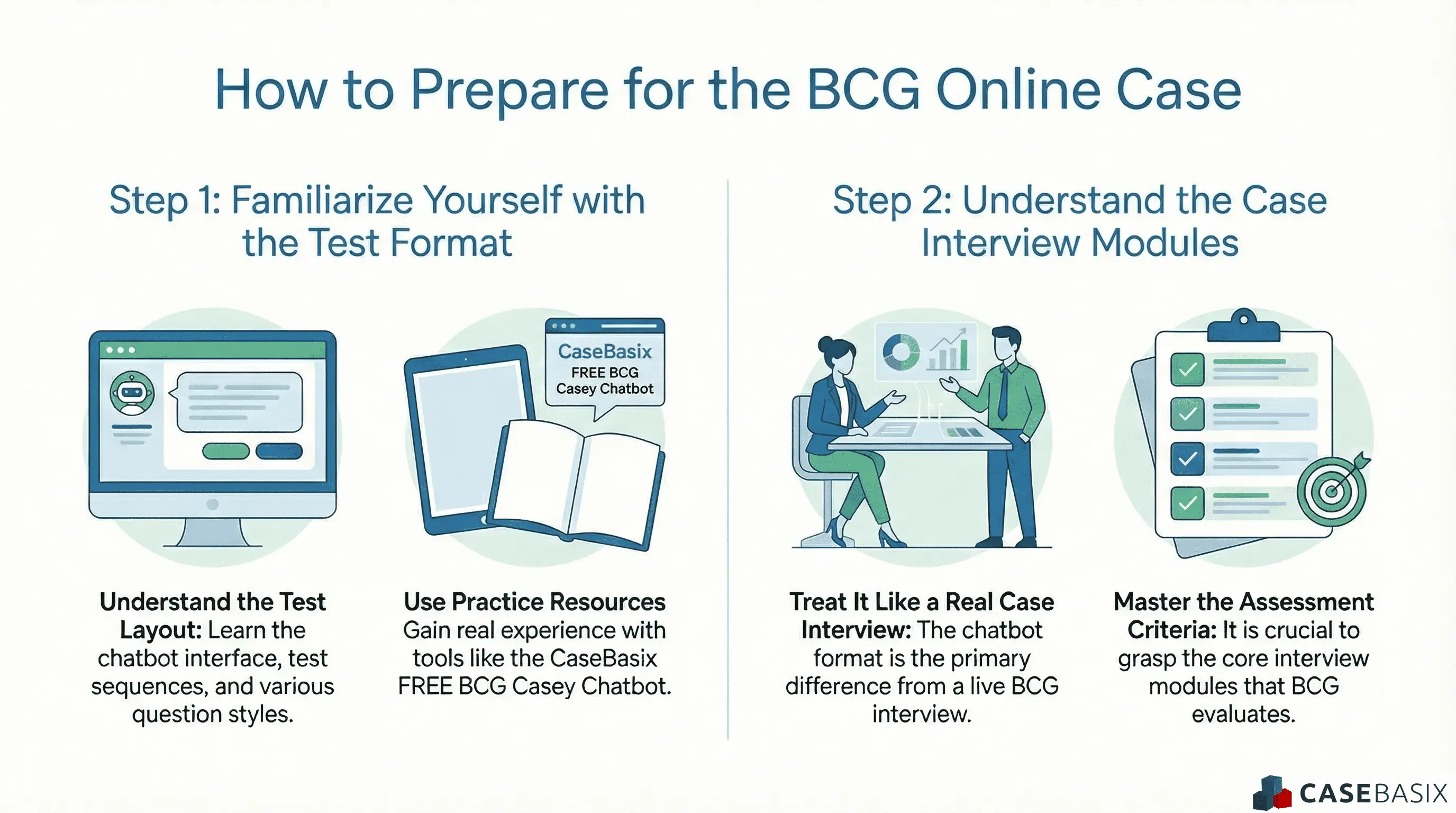
A step-by-step visual guide showing how candidates can prepare effectively for the BCG Online Case assessment.
This infographic highlights the essential steps to prepare for the BCG Casey Chatbot, from learning the test format to understanding each assessment module. It reinforces how structured practice and familiarity with question types improve performance. Use it as a quick reference before starting your preparation.
Tip 1: It is Critical that you Familiarize Yourself with the Test Format
Start by getting familiar with the test's layout, including the chatbot interface, test sequences, the traits being evaluated, and the different question styles and formats. Helpful resources to assist you in achieving this understanding include:
- Our FREE BCG Casey Chatbot Simulation, offering a real practice experience.
- This article.
Tip 2: Understand Case Interview Modules
Understand that the BCG Online Case (Casey Chatbot) closely resembles the actual case interview, with the primary difference being the use of a chatbot for assessment. Therefore, it's crucial to grasp the criteria and Case Interview Modules that BCG assesses.
Tip 3: Practice Practice Practice
Remember the saying, "Practice Makes Perfect." There's no better way to prepare than by getting hands-on experience. You can find the FREE BCG Casey Chatbot Simulation here! 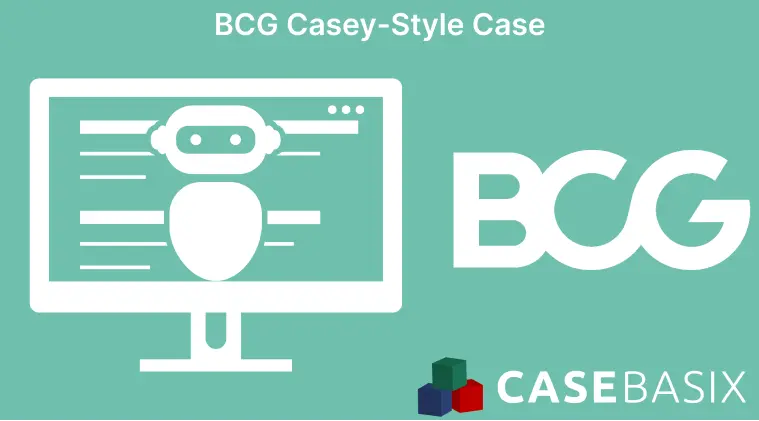
Frequently Asked Questions
Q: What is the BCG Online Case (Casey Chatbot)?
A: The BCG Online Case (Casey Chatbot) is an interactive tool used to simulate consulting cases, helping candidates prepare for real-world consulting scenarios and improve their problem-solving skills.
Q: How do I prepare for the BCG Online Case (Casey Chatbot)?
A: To prepare for the BCG Online Case (Casey Chatbot), practice critical thinking and case-solving strategies while familiarizing yourself with common business challenges in the consulting industry.
Q: Is the BCG Online Case (Casey Chatbot) difficult?
A: The BCG Online Case (Casey Chatbot) can be challenging due to its interactive format and time constraints, but with practice, you can improve your analytical and problem-solving skills.
Q: How long does the BCG Online Case (Casey Chatbot) take?
A: The BCG Online Case (Casey Chatbot) typically takes around 30 to 45 minutes to complete, depending on the complexity of the case and the candidate’s approach.
Q: Can I retake the BCG Online Case (Casey Chatbot)?
A: Retaking the BCG Online Case (Casey Chatbot) is generally not allowed. However, you can practice similar case studies to improve your skills and understanding.

